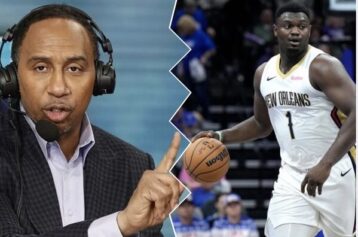“The Zion Effect” is driving revenue for everyone except for the man himself.
Even before he stepped onto the Duke University grounds in Durham, NC, his presence was well known.
If you watched YouTube or visited the Hoop Hall Classic last year, you would understand that his impact was already being felt both on the court and on the wallet.
At a sold out Hoop Hall in 2018, our Editor-in-Chief, Ali Danois, was in the house to watch players such as Xavier Pinson, Terence Williams and Zion’s future teammate, R.J Barrett. While those players and many others entertained the crowd, everyone knew who the main attraction was that weekend.
Hailing from South Carolina, the 6-foot-7, defensive end-resembling baller was the highlight of that weekend, and his ability to attract and wow crowds have only increased in his lone year of playing college basketball.
Currently averaging 22.4 points, 9.2 rebounds and 2.4 assists per game, Zion is dominating on the court for the No. 1 ranked, 23-2 Blue Devils. With every rim-rocking dunk and high jump/broad jump-infused block, Zion is driving the basketball world insane.
GOOD GOD Zion Williamson! 😱 pic.twitter.com/e13rP7McYD
— Basketball Forever (@bballforever_) February 10, 2019
He is the rare athlete that fans get to see and experience every few decades. Names like Mike Tyson, Shaq and LeBron immediately come to mind as athletes who are physically and mentally gifted, and head and shoulders above the competition.
Athletes who are barely in their 20’s with the ability to dominate grown a** men. Their performances and names become legendary, eventually becoming men immediately recognized by a single name.
Williamson has taken steps to enter that conversation. Say “Zion” and people immediately know who you’re referring to. He’s become such a big name, and topic of discussion, that some are debating whether he should really flip the script and shut down his collegiate career now in order to prepare for the NBA.
While Zion has denied that thought, it’s an interesting one to entertain. College football players have been doing that more frequently, skipping the bowl season in order to prepare for life at the next level.
Yet Zion is rare not only because of his talent and athleticism, but also because of his ability to help the Blue Devils win both on the court and at the bank.
The Zion Effect
Even Coach K. cannot deny the frenzy that Zion creates when he comes to town, fans lining up days in advance to secure a ticket, with athletes and celebrities like LeBron and Jay-Z traveling to watch the potential No.1 pick in the 2019 NBA Draft.
His appeal has attracted major attention while also increasing revenue in a system void of athlete compensation. According to The Sporting News, ticket prices for tonight’s game in Durham have exploded into the realm of ridiculous:
“The most expensive ticket sold by Vivid to Wednesday night’s game? Try $10,652, nearly double the $5,400 price for the steepest ticket to last season’s game. As of Tuesday, the cheapest ticket cost $2,990. The most expensive ticket left: $6,452.”
Zion has driven up prices at every away venue he’s appeared in, with tickets going up an average of 178% at SeatGeek. This trend includes at Duke where, according to SeatGeek, the average re-sale price of a ticket is now $264. This makes the Blue Devils, per Nate Rattner of Seat Geek, “the most “in-demand” of any men’s college basketball team.”
Fans not only spend more to see him play, but they also travel more for the Zion experience. The “Zion Effect” is real and has real impact on the bottom line for every school and entity he’s surrounded by.
According to Vivid Seats, fans traveled an average of 170 miles last year to see the Blue Devils play on the road. This year that number has increased to 186 miles, a number which is the highest over the last five years.
“Some artists and teams have, over the span of decades, cultivated fans bases willing to travel great lengths to watch them,” said Stephen Spiewak of Vivid Seats in the Forbes article. “Fans of Phish, Garth Brooks and The Grateful Dead will trek great distances to watch them. Over the last four months, this Duke team has developed a similar appeal.”
There’s one reason for this trend. Actually, one name to attribute to this increase in travel.
Zion.
✅ 25 points
✅ Season-high 6 dunks
✅ WinZion Williamson was EATING last night against Indiana 😈 pic.twitter.com/rPWZUsFTtO
— ESPN (@espn) November 28, 2018
Even Coach K. recognizes the power of the Zion Effect.
“Nobody has brought in the exposure that he brought in.” said the Blue Devils head coach after the team’s win over St. John’s. “He had over a million or two million followers before he got here. When does that happen? It may never happen, but it’s happening for him.”
And it’s happening for broadcast partners as well. After Duke beat Virginia, 72-20, in January, ESPN boasted about the ratings for that game.
“Saturday’s top-5 matchup between then-No. 4 Virginia and No. 1 Duke delivered a Nielsen reported audience of 3,764,000 viewers, making it the most-watched college basketball game across all networks this season. The audience peaked at 4,980,000 viewers in the telecast’s final minutes of the game.”
Zion has the Midas Touch for everyone….except his present self.
Playing For A Future Payday
There’s no denying the Zion effect at any level.
Like the Fab Five over two decades ago, Zion has become an economic boon for Duke and all affiliated parties. He could be considered an economy by himself, one that drives revenue consistently for every partner he’s surrounded by.
The biggest travesty is that the only person he doesn’t create actual revenue for presently is himself, as collegiate athletes aren’t compensated for their play.
We know the argument about him receiving a free education so that is compensation enough. But when you see the numbers above, factor in jersey sales and recognize the fact that television networks will increase the commercial rate for every game he appears in, you understand how flawed that argument is.
It’s a manifestation of the frustration Chris Webber expressed as a student athlete in “The Fab Five” documentary, fuming that while he was playing for the Wolverines and traveling all over the country, he couldn’t even afford to buy his own jersey at a sporting goods store.
It’s an example of what former athletes like Ray Allen and Jay Bilas have been vocal about.
When the economic success of a program thrives primarily because of a player like Zion, there’s no denying that the single year scholarship, stipend and room and board he receives will be severely dwarfed by the revenue he drives by playing.
Is it an understood reality for players like Zion Williamson? Absolutely. But that doesn’t mean that it’s right, nor does it mean that it should remain that way.
If things continue in the current state, we can predict the future for Zion. He will dominate in the ACC Tournament, help the Blue Devils secure a No. 1 seed in the NCAA Tournament, win another National Championship for Duke, go on to be the number one draft pick at the NBA Draft in June and extend the success of the Zion effect at the pro level.
“He’ll be a ratings bonanza that will sell out every college arena next year before becoming a very rich man once the 2019 NBA Draft rolls around,” were the prophetic words uttered last year by Ali Danois.
But regardless of the ultimate outcome, there’s still no denying that while the economy of Zion is growing at a high rate, the true monetary returns for him won’t be realized until he signs his pro contract.
And that makes him the most underpaid athlete in sports today.



